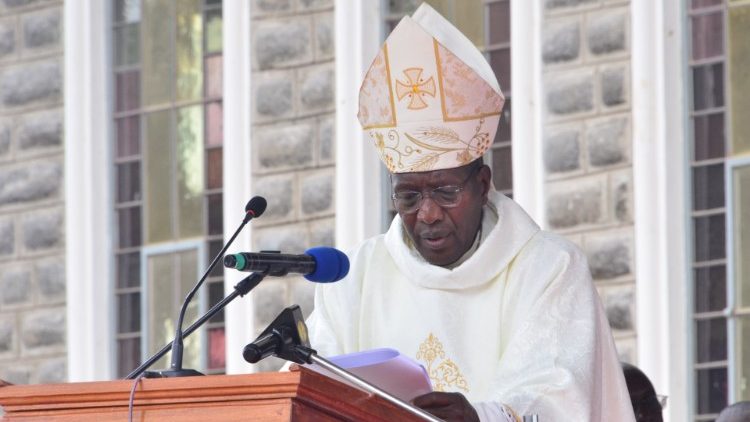KENYA: Catholic Church Calls on Kenyans to Act Urgently and Address Deep-seated Resentments

Bishop Rotich; Credit KCCB
Sr. Jecinter Antoinette Okoth, FSSA
The Catholic Church through the Kenya Conference of Catholic Bishops (KCCB) has reminded Kenyans of the deep-rooted resentments that have attributed to the failure of journeying together as a reconciled family of God.
Reflecting on the historical roots of division within the country which needs to be addressed, Bishop Alfred Kipkoech Rotich of Kenya’s Kericho Diocese highlighted that colonialism left an indelible mark on the nation’s psyche since “colonizers, employed the divisive tactic of “divide and rule,” and sowed the seeds of tribal discord.”
This manipulation the Bishop said, “not only perpetuated tribal differences but also corroded the bonds of trust among Kenya’s diverse ethnic group,” a situation which citizens should move away from, and instead, “learn from valuable historical experiences to treat our neighbors better.”
Bishop Rotich was sharing his homily with thousands of Christians who attended the annual National Prayer Day on Saturday, October 7, at the Marian Shrine located in Nakuru Diocese and revealed further that politics of exclusion in the country, “has led to a heightened sense of resentment among the populace, as certain groups feel marginalized and excluded from the political landscape.”
Highlighting some of the deep-rooted resentments that have affected Kenyans, the deputy for the Commission of Ecumenism and Inter-religious Dialogue at KCCB pointed out the culture of corruption and tribalism that is driven by unchecked greed.
“This pervasive culture (Corruption) has eroded public faith in government institutions and services. This erosion of trust has, in turn, driven desperate but otherwise righteous individuals to participate in corrupt practices to meet their basic needs, leading to a moral crisis of formed conscience,” the Bishop said and added that, “the erosion of moral values perpetuates a cycle that hampers genuine reconciliation and unity.”
He further cited tribalism as another symptom of a deeper-seated, unresolved national problem saying that “People are continually singing the song of tribalism, and that is the enemy within that we must fight.”
With the identified concerns, the former Bishop of Kenya’s Military Ordinariate proposed that instead of blaming the past, including colonial legacies and the actions of our national founders, “we must take responsibility for repairing historical injustices and establishing a strong foundation for a united and reconciled nation,” emphasizing that, “Future generations look up to us to reconcile in order to journey together as a reconciled family.”
As a way forward, the Bishop called on Christians and all Kenyans to form a credible team of elders from diverse backgrounds across the country to spearhead reconciliation in local communities.
“These elders should be entrusted with addressing grassroots conflicts, cross-border tensions, and issues like cattle rustling that have long plagued our communities,” he said and continued, “Their wisdom and experience can serve as a bridge to foster reconciliation and understanding.”
He also proposed the formation of a reconciliation committee from the Small Christian Communities (SCCs) with the Justice and Peace Commission (JPC) taking the lead, and with the necessary support of the Pastoral Commission and the Social Communication Communications offices in each Diocese, form a Reconciliation Committee of five respectable persons whose term of office will be defined by the length of the kind of reconciliation needed in the respective Diocese but no more than three years.”
According to the Kenyan Prelate, the reconciliation committee will have the mandate to “discuss and identify between three and five major divisive issues that scatter rather than bring people together in the diocese, share with the national office, JPC, the identified major issues in order to compare and contrast the issues with other Dioceses and where there is a need for initiative to strengthen reconciliation processes under the guidance of the Local Ordinary.”
With this in mind, the Bishop said that the reconciliation process should have integral values including telling the truth, humility and empathetic listening, having a non-judgmental attitude, and being patient.


